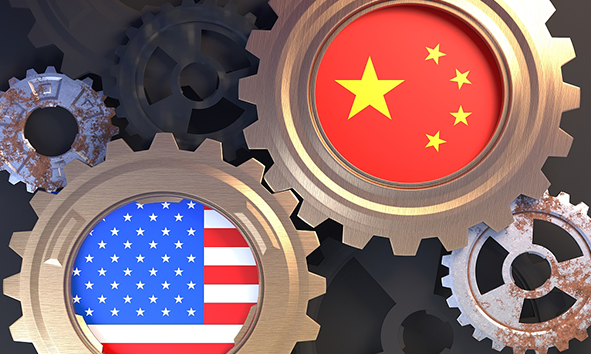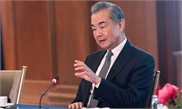US, China cannot adopt ‘lying-flat’ attitude, otherwise worst-case scenario is likely to occur: former Chinese diplomat

us china
The majority of people in both China and the US have realized that if conflict and confrontation occur between China and the US, the world would undoubtedly face catastrophe. However, this does not mean that we can automatically avoid this worst-case scenario by adopting a "lying-flat" attitude, Chinese former ambassador to the US Cui Tiankai told at a high-level dialogue at the 10th Beijing Xiangshan Forum on Sunday.
Speaking on the relationship between major powers, Cui stated that if China and the US, as two major countries, were to engage in conflict and confrontation, it would undoubtedly be catastrophic for both countries and the world at large. "The majority in both countries are rationally aware of this. However, this doesn't mean that we can automatically avoid conflict and confrontation by doing nothing. It requires the joint efforts of both sides. If we choose to 'lay flat' and do nothing, the very thing we least want to happen is very likely to occur," Cui emphasized.
Regarding the "cyclical" nature of China-US relations and when the current US containment of China might change, Cui pointed out that China-US relations have never been simple and are multifaceted.
As US policy toward China has always had aspects of coordination and cooperation with China, as well as containing China's development, and even attempting to "change China," China-US relations also have two manifestations, he said.
Sometimes cooperation and coordination are more prominent, while at other times, confrontation and struggle are more evident. However, this doesn't mean that when one aspect is more prominent, the other ceases to exist. The other aspect is always present and may become the main expression under certain conditions, Cui emphasized.
"Therefore, it is challenging to define a cycle solely by cooperation. The key is that both sides need to realize that as two major countries, they should find the right way to get along. As long as both sides can acknowledge and accept this, China and the US can coexist peacefully while maintaining their differences without breaking apart," he said.
When the first APEC Leaders' Meeting was held in Seattle, US, 30 years ago, where the heads of state of China and the US were able to meet, it provided a great start to high-level communications between the two countries for the decades to follow, Cui said.
"Now, 30 years later, the APEC Leaders' Meeting has returned to the West Coast of the US. At present, both China and the US have a lot of preparatory work to do, striving to realize a meeting between the heads of state of the two countries through joint efforts," Cui said as he mentioned that once realized, this meeting is worth paying attention to for its potential strategic guiding role in China-US relations for the coming years.
Regardless of how the US expresses itself, the key to China-US relations lies in whether the US can achieve mutual respect, peaceful coexistence, and win-win cooperation with China, Cui said.
He also stressed that the US needs to respect China and accept China's development. "Firstly, it must respect China's sovereignty and territorial integrity, the issue of reunification, and in particular, the Taiwan question."
The US should respect China's path and institutional choices. "China has its own path, system, and theoretical culture. Can Americans respect that? China needs to implement democracy and promote human rights in ways that suit its national conditions. Can Americans accept that? Additionally, China has the right to achieve legitimate development and work toward modernization with Chinese characteristics. Can Americans accept that?" Cui asked.
"Now there is a term in the international community called 'taking sides,' and many countries really dislike this term," Cui said. He explained that the US often requires its allies to adopt the same policies based on its strategic needs or its perception of the world. However, the allies make judgments and take actions based on their own long-term national interests.
"There might be a few countries that automatically choose sides, like Japan, for example, but the vast majority of countries do not agree with this approach. In line with the spirit of building a community of shared future for mankind, all countries should choose to side with the common interests of humanity and stand on the right side of history," Cui said.
Regarding some extreme anti-China figures in the US, the former Chinese ambassador explained that the US is a large country home to all kinds of people and viewpoints, which is not surprising in itself.
However, many of these extreme anti-China individuals have never been to China and do not know what the real China is like. "They do not understand China's history and culture, nor do they know what the ordinary Chinese people are thinking. They proceed completely from a subjective standpoint. Frankly speaking, some so-called scholars and China experts may speak a few words of Chinese and have studied some things about China, but do they truly understand China? These people are often very dangerous because, as 'experts,' they are misleading readers," Cui said.
As the China-US exchanges are gradually recovering, similar interactions are being expanded and further deepened, Cui said.
Both China and the US have responsibilities to base their understanding and judgments of each other on realistic and factual grounds, especially some American politicians who need to understand the real China more, understand today's China, understand what the Chinese people are thinking, why China has formulated such policies, why it has taken such a path, and why it has such a system, Cui noted.

